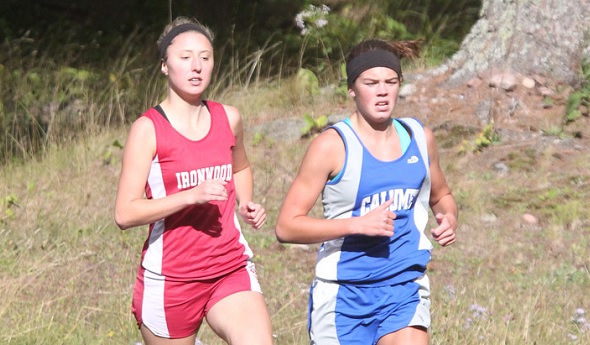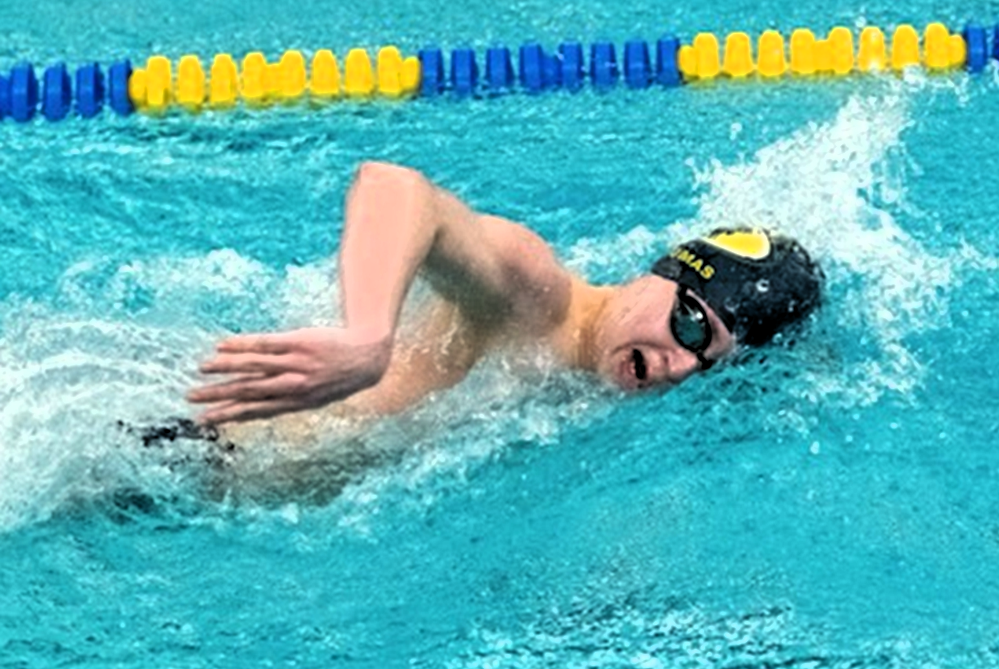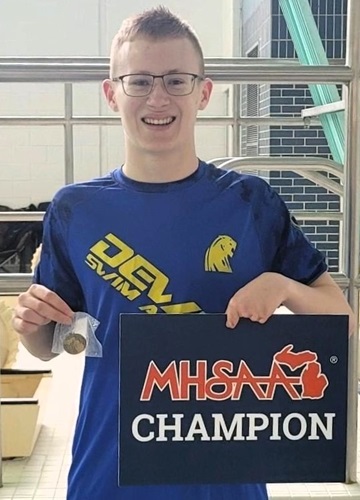
Calumet Invite Produces Northern Stars
September 18, 2013
By Geoff Kimmerly
Second Half editor
The Calumet Invitational dates back roughly 30 years as an annual staple of the cross country schedule for schools at the northernmost tip of Michigan's Upper Peninsula.
A creative move by the Copper Kings last year added some statewide prestige to the event.
 Last week, for the second season, Calumet ran the series of races at Keweenaw Mountain Lodge, a resort near Copper Harbor and the northern bank of the Keweenaw Peninsula.
Last week, for the second season, Calumet ran the series of races at Keweenaw Mountain Lodge, a resort near Copper Harbor and the northern bank of the Keweenaw Peninsula.
Calumet is the northernmost high school in Michigan. And moving this race another 35 miles northeast more or less guaranteed it's the northernmost event run in the state.
"We figured it was pretty safe. We're the northernmost school in the state, and you can only go four more miles and you're in Lake Superior," Calumet athletic director Sean Jacques said. "Nobody else is going to do anything more north than that."
A total of 10 schools were represented this fall in the races for boys and girls varsity, junior varsity and middle schoolers.
Jacques said the event formerly was run at a golf course in Calumet. But a few years ago, Calumet graduate and former Copper Kings cross country runner Dan Harri moved home from Florida to become general manager at the Mountain Lodge (he's also a renowned chef and has owned restaurants in Miami with Hall of Fame Dolphins coach Don Shula).
Harri had asked a few times about bringing a cross country or golf event to the lodge. Jacques told him last year they'd give it a try, so Harri set up a course that includes golf course, a couple of bridges, trails and finishes with a climb on the No. 1 fairway. It also provides various points for fans to watch runners go by, not always available on other courses.
"We were looking for a little bit of a change, and it's a beautiful course," Jacques said. "We thought if people were willing to make the extra drive, it would be really nice."
Calumet won the boys race this season, just ahead of runner-up Houghton. Houghton's girls were victorious, followed by the host Copper Kings.
Click to read more about this year's event from the Houghton Mining Gazette.
Michigan's claim to an NFL evolution
As part of its NFL preview this month, Sports Illustrated reported on one of the most significant developments for offenses over the last few decades – the silent snap count, which is used regularly by visiting teams because offensive linemen can’t hear the quarterback calling for the ball over the clamor of the home crowd.
And the article explained that the silent snap count might’ve gotten its start at one of Michigan’s smallest high schools – Flint’s Michigan School for the Deaf.
Offensive linemen during the 1980s were feasted on by pass rushers like Lawrence Taylor and Bruce Smith, who built record sack totals by blasting past blockers who seemed a step slow. Turns out, that was true. Defensive players were getting an edge by attacking as soon as they saw the ball move. But blockers (especially offensive tackles), focused instead on the defensive ends and linebackers lined up across from them, and didn’t have the luxury of watching the ball – and since they also couldn’t hear the snap count, started each play a step behind.
Enter the silent count. The quarterback signals to the center that he is ready to receive the ball (with a pat on the back, by raising a foot, etc.). The center then raises his head, and after a predetermined count of at least one second snaps the ball without a sound. This means an offensive tackle doesn’t have to listen for a snap count – he just counts after seeing the center get set.
The SI report recognized longtime offensive line coach Howard Mudd as the guru of the silent snap count. But Mudd recalled a conversation he’d had while working for the Seattle Seahawks with another coach, the late Andy MacDonald, who also had coached early in his career at a school for the deaf in Michigan.
The article doesn’t mention Michigan School for the Deaf by name. But it seems to make sense that the Tartars were the first to use the now-revolutionary count. MacDonald – who played at Central Michigan University and went on to coach at Michigan State and four other colleges and also for the Buffalo Bills – grew up in Flint and attended Flint Northern before playing for the Chippewas from 1950-53. The historical web site Michigan-football.com has results for Flint’s Michigan School for the Deaf dating to 1950, making it a decent assumption that MacDonald might’ve gotten in a little early coaching experience at the school down the road from his home.
Click for the SI story and go to page 4 for the mention of Michigan’s school.
Michigan mourns trooper, running standout
The law enforcement community is mourning the death of Michigan State Police trooper Paul Butterfield, who was shot Sept. 9 during a traffic stop in Mason County. He also was a well-known distance runner during the 1980s and the MHSAA Class A cross country champion running for Bridgeport in 1987.
According to a Ludington Daily News report, Butterfield continued running after high school at the University of Tennessee, and also competed at the 1989 Pan American Junior Games in Argentina.
Butterfield was stationed in Hart after previously serving in Manistee, and lived in Mason County. He also had served in the U.S. Army. Click to read more from the Ludington Daily News.
PHOTO: Calumet's Chelsea Jacques (right) won this season's Calumet Invitational with a time of 21:08.06, just ahead of Ironwood's Jessica Gering at 21:46.16. (Photo courtesy of Calumet athletic department.)

DeWitt's Thomas Blazes Swimming Path with Historic Finals Performance
By
Steve Vedder
Special for MHSAA.com
April 4, 2024
Aaron Thomas easily could have decided that swimming wasn't going to be part of his life.
 The DeWitt senior could've pieced together some combination of his other entertainment interests to fill his time. For instance, he could have spent more time with friends or immersed himself in video games. Or maybe devoted more time to a flirtation with golf or playing trumpet in the school band. Thomas also could have gained a head start on college and his ultimate goal of a degree in biomedical engineering.
The DeWitt senior could've pieced together some combination of his other entertainment interests to fill his time. For instance, he could have spent more time with friends or immersed himself in video games. Or maybe devoted more time to a flirtation with golf or playing trumpet in the school band. Thomas also could have gained a head start on college and his ultimate goal of a degree in biomedical engineering.
Considering the lifetime of challenges he's faced in swimming, those seemed more tenable options.
Instead, Thomas chose the tougher path.
"My life is swimming," he said. "I've been in water so much, I've never looked back."
By "looking back," Thomas means ignoring a disability that would have turned many youngsters away from the pool. He was born without 65 percent of his pointer finger on his left hand and with a thumb that's only about 90-percent intact. The other three fingers stop at the top of the knuckle. As DeWitt coach Brock Delaney explains, much of a swimmer’s success comes from the power of fingers and subsequent strength in the hands – and without that combination, swimmers are at an immediate disadvantage.
But rather than letting those obstacles keep him high and dry, Thomas has excelled and finished this season with a historic first. He qualified for the Lower Peninsula Division 3 Finals in the 200-yard individual medley and finished 29th and also competed in the Paralympic 100 freestyle exhibition event and topped all divisions with a time of 54.07 seconds. In doing so, Thomas became the first competitor to swim that combination at a Finals meet.
Thomas additionally this winter made DeWitt's Century Club of swimmers who have amassed 100 points in a season for the second time, and he has earned National Interscholastic Swim Coaches Association (NISCA) Paralympic All-American honors in the 200-yard freestyle (1:56.64), 200 IM (2:08.21), and 500 free (5:11.58). He also competes in Paralympic swimming as part of the Mid-Michigan Aquatics Club.
To some, the quest for those achievements likely would seem a long and difficult path. But to Thomas, it's business as usual. A disability? What disability, offers Thomas, whose ultimate goal is swimming in the 2028 Summer Paralympics in Los Angeles.
"I've always loved swimming," he said. "When I'm in the water, I never worry about anything. I just feel free."
 And Thomas has found a way to even the playing field, Delaney said.
And Thomas has found a way to even the playing field, Delaney said.
"He's such a hard worker who has made up for a left-hand deficiency," Delaney said. "He's legit, a strong kid who loves to swim. "
But determination can take a swimmer only so far. Delaney said Thomas, classified as an S10 swimmer for Paralympic events, has developed physical strategies to increase his performance. In the backstroke, for instance, Thomas swims with his left hand underwater to help in propulsion. For speed, Thomas tries to keep his body on his "power side."
The rest, Delaney said, is simply heart.
"He moved here from Alma between his eighth grade and freshmen years," he said. "If not our hardest worker, he's in the top three. He's got something not all athletes have."
Thomas said one of the chief reasons he spends so much time around pools is the type of person he finds there. He describes people who combine encouragement and understanding with a will to compete despite any perceived physical shortcomings. What he's learned from them not only explains his swim career, but teaches valuable life lessons as well.
In fact, Thomas' career plans, beginning at Hope College in the fall, include securing a degree in biomedical engineering with an ultimate plan to help build prosthetics.
"Getting to know people in the prosthetic field really interests me," he said. "Swimming and prosthetics have been a nice tie-in with school. Prosthetics ties it all together for me."
Thomas said he can think of only a single instance where he questioned whether he should follow his love of swimming. But that thought quickly passed, and he's thrown himself into the sport ever since.
"I wouldn't trade my disability for the world," he said. "It's given me so many opportunities. The whole club and school thing and getting to the state meet never would have happened.”
Thomas will swim at Hope, and his goal is to qualify for the 200 IM at the Los Angeles Paralympic games. Thomas estimates he's within 15 seconds of qualifying in that meet's long course event.
"It's achievable," he said. "For sure it's doable."
Whether he makes it to Los Angeles or if his swim career quietly winds down, Thomas, who describes himself as competitive, said he still will have gained something for which everyone strives, athlete or not.
"Water has always been a safe spot for me," he said. "I think I've always used it as kind of a break from life. It helps clear my head.
“I've always been taught that you get out of work what you put into it. Work always pays off in the end. I've always remembered that.”
PHOTOS (Top) Aaron Thomas races for the DeWitt swimming & diving team. (Middle) Thomas posted the fastest time across all divisions in the Paralympic 100 freestyle exhibition at this season’s Finals. (Photos provided by the DeWitt swimming & diving program and Thomas family.)

